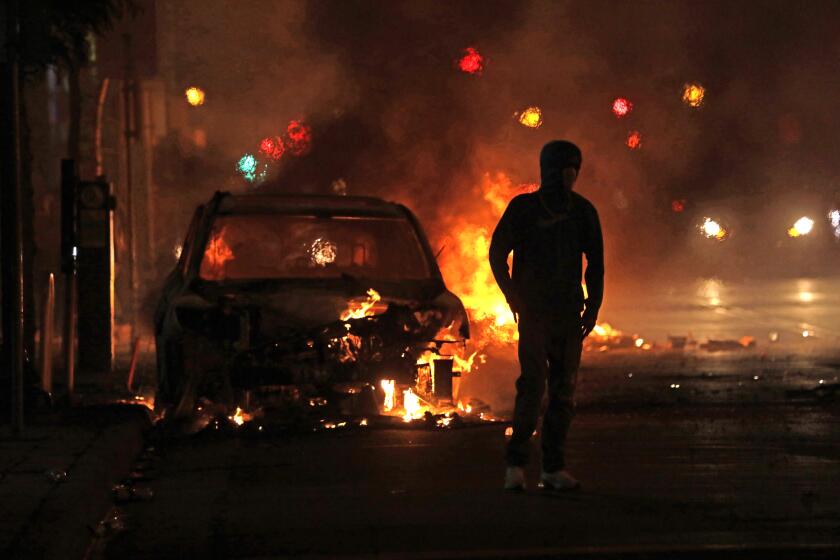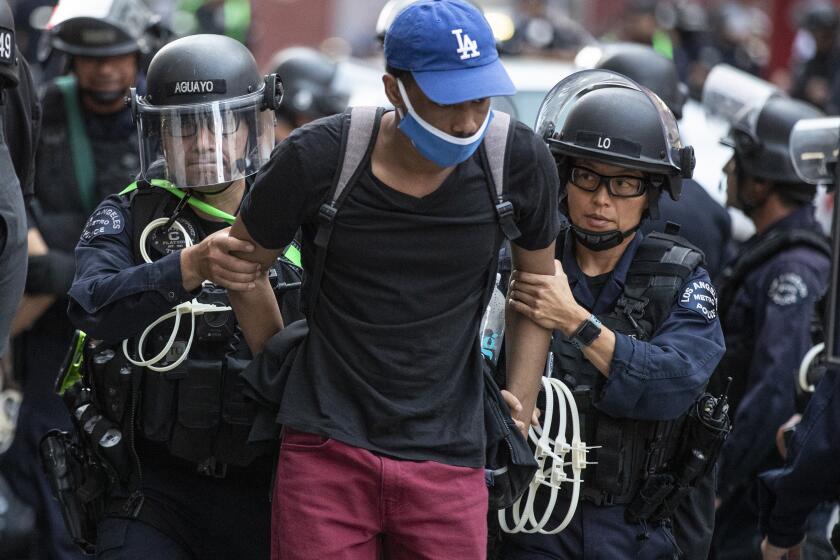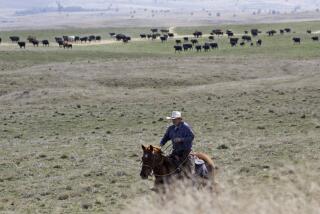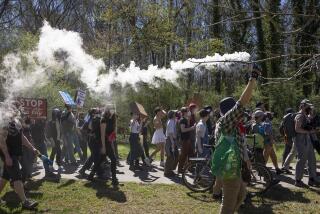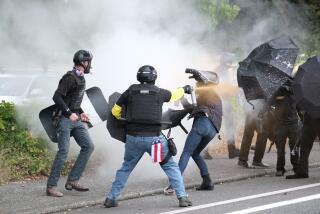Portland, a city used to protests, is reeling from nightly chaos
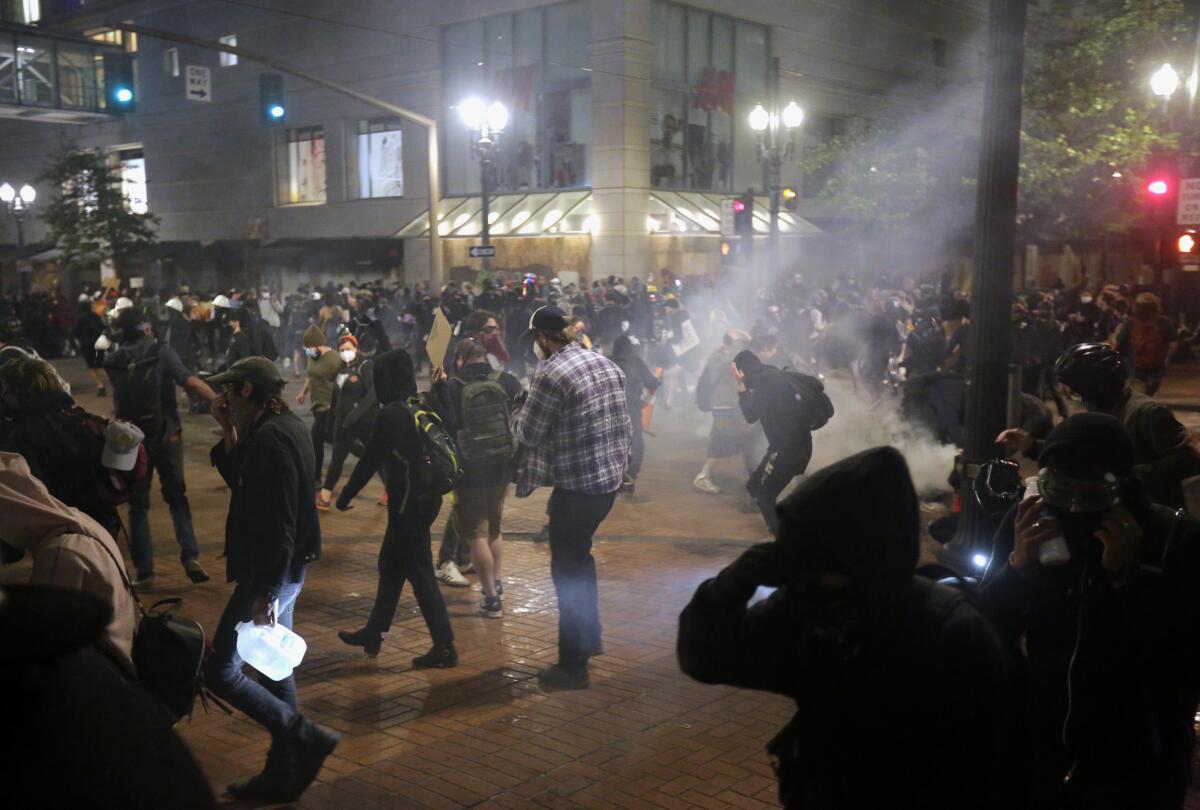
PORTLAND, Ore. — This liberal city is so well-known — and usually prepared — for messy protests that it was once famously nicknamed “Little Beirut.” But even it is reeling from the nightly unrest splintering off from peaceful demonstrations over police killings of African Americans.
For five nights, these smaller breakaway groups have smashed windows, set fires, broken into a building housing police headquarters and spray-painted walls and sidewalks. The mayhem is not unique to Portland during the national upheaval over the death of George Floyd in Minneapolis, but the sustained demonstrations have pushed police to the brink — unusual for a city well-versed in civil disobedience.
A visibly frustrated Portland Police Chief Jami Resch pleaded Wednesday for people to help stop those “holding our city with violence.” More than 10,000 people had demonstrated peacefully in the city the day before — one of the largest protests in the U.S. on Tuesday — before violence broke out after nightfall.
“How do we come together to stop the violence and destruction in our city so we can move forward to identify solutions that can work? How long can we, as a city, endure the extreme disregard for human life and property demonstrated by a small group of individuals?” Resch said at an emotional news conference Wednesday. “We have to collectively come together to stop those who are holding our city with violence. ... Every night, we are using all our resources, and it is still not enough.”
Police say they have struggled to balance allowing thousands of peaceful protesters to march while confronting much smaller crowds that seem focused on clashing with officers at any cost.
At least one city leader has blamed white supremacists for infiltrating the crowds and stirring up trouble, while others have blamed far-left anti-fascist activists — antifa — who have had a strong presence in Portland for years. Resch said it’s too soon to say whether activists of any stripe are coming from out of town.
Figures across the political spectrum have been quick to defend their own citizens as peaceful protesters while accusing outsiders of fomenting the unrest.
She said the smaller groups “continued to focus on police,” throwing ball bearings, bottles, bats and mortars at officers, setting fires and trying to rip down a fence set up around a building housing police headquarters and a sheriff’s jail. Officers began tagging some cars with spray paint Tuesday for later identification after noticing the people inside were handing out weapons as the unrest unfolded, she added.
Critics, including at least two city leaders, blasted police for using tear gas and concussion grenades against protesters. Aerial video Tuesday night showed a speeding patrol car almost hitting several demonstrators, which raised more questions. Resch did not address those incidents directly when asked.
“I am absolutely horrified by what I saw last night. It is sadistic to be using tear gas in the middle of a public health crisis,” City Commissioner Chloe Eudaly said at a public meeting Wednesday, referring to the COVID-19 pandemic.
People in Portland have reliably turned out over the decades to oppose wars, social injustice and, most recently, to counter right-wing and white supremacist groups that have turned the liberal city into a flash point over free speech. Last year, thousands of protesters and counter-protesters clashed on multiple occasions in Portland, drawing international attention for demonstrations that routinely turned violent and ended in dozens of arrests.
Residents also show up regularly for peaceful rallies for causes that range from climate change to women’s rights. Demonstrations are so common that some in the city joke about “Free Speech Fridays,” when the downtown is filled with chanting and people are nearly as likely to head to a protest as a bar as the workweek ends. A staffer for President George H.W. Bush dubbed Portland “Little Beirut.”
People in the Middle East, accustomed to popular discontent and heavy-handed security tactics at home, are watching similar scenes unfold in the U.S.
Those events, while sometimes just as volatile, have almost always wrapped up in a day. Now, an understaffed police agency is relying on state troopers and officers from surrounding counties and cities as far away as Washington state to keep up. National Guard soldiers, even in a support role, further unsettled protesters.
More than 100 people were arrested and dozens more were taken into custody Tuesday. Hours after the streets returned to normal, Resch said the violence was overshadowing the protesters’ much-needed message for police reform and accountability.
“There are many thousands of you who are not involved in violence and destruction, and I thank you. I still hear your message,” she said. “We do not condone violence in this city. These actions are not welcome.”
Breaking News
Get breaking news, investigations, analysis and more signature journalism from the Los Angeles Times in your inbox.
You may occasionally receive promotional content from the Los Angeles Times.
The Pacific Northwest Youth Liberation Front, a group that says it’s “dedicated to direct action towards total liberation,” has gained visibility on social media as it urges protesters to act.
Ahead of another protest Wednesday night, the group advised people to form groups for protection, reposting an article calling the strategy “the essential building block of an anarchist organization.” The group did not reply to an email seeking comment Wednesday.
“The Portland Police, like all police, are an occupying army on stolen land, and that is as clear tonight as it has ever been,” a post on the group’s Twitter account said late Tuesday.
More to Read
Sign up for Essential California
The most important California stories and recommendations in your inbox every morning.
You may occasionally receive promotional content from the Los Angeles Times.
